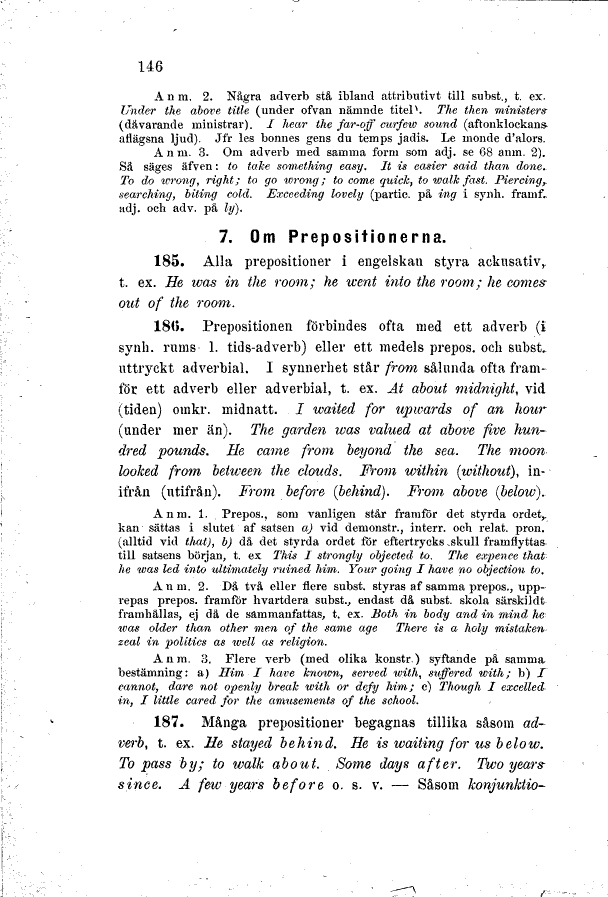
Full resolution (TIFF) - On this page / på denna sida - 6. Adverb. - 7. Prepositioner.

<< prev. page << föreg. sida << >> nästa sida >> next page >>
Below is the raw OCR text
from the above scanned image.
Do you see an error? Proofread the page now!
Här nedan syns maskintolkade texten från faksimilbilden ovan.
Ser du något fel? Korrekturläs sidan nu!
This page has been proofread at least once.
(diff)
(history)
Denna sida har korrekturlästs minst en gång.
(skillnad)
(historik)
146
Anm. 2. Några adverb stå ibland attributivt till subst., t. ex.
Under the above title (under ofvan nämnde titel). The then ministers
(dåvarande ministrar). I hear the far-off curfew sound (aftonklockans
aflägsna ljud). Jfr les bonnes gens du temps jadis. Le monde d’alors.
Anm. 3. Om adverb med samma form som adj. se 68 anm. 2).
Så säges äfven: to take something easy. It is easier said than done.
To do wrong, right; to go wrong; to come quick, to walk fast. Piercing,
searching, biting cold. Exceeding lovely (partic. på ing i synh. framf.
adj. och adv. på ly).
7. Om Prepositionerna.
185. Alla propositioner i engelskan styra ackusativ,
t. ex. He was in the room; he went into the room; he comes
out of the room.
186. Prepositionen förbindes ofta med ett adverb (i
synh. rums l. tids-adverb) eller ett medels prepos. och subst.
uttryckt adverbial. I synnerhet står from sålunda ofta framför
ett adverb eller adverbial, t. ex. At about midnight, vid
(tiden) omkr. midnatt. I waited for upwards of an hour
(under mer än). The garden was valued at above five hundred
pounds. He came from beyond the sea. The moon
looked from between the clouds. From within (without), inifrån
(utifrån). From before (behind). From above (below).
Anm. 1. Prepos., som vanligen står framför det styrda ordet,
kan sättas i slutet af satsen a) vid demonstr., interr. och relat. pron.
(alltid vid that), b) då det styrda ordet för eftertrycks skull framflyttar
till satsens början, t. ex This I strongly objected to. The expence that
he was led into ultimately ruined him. Your going I have no objection to.
Anm. 2. Då två eller flere subst. styras af samma prepos., upprepas
prepos. framför hvartdera subst., endast då subst. skola särskildt
framhållas, ej då de sammanfattas, t. ex. Both in body and in mind he
was older than other men of the same age. There is a holy mistaken
zeal in politics as well as religion.
Aum. 3. Flere verb (med olika konstr.) syftande på samma
bestämning: a) Him I have known, served with, suffered with; b) I
cannot, dare not openly break with or defy him; c) Though I excelled
in, I little cared for the amusements of the school.
187. Många prepositioner begagnas tillika såsom adverb,
t. ex. He stayed behind. He is waiting for us below.
To pass by; to walk about. Some days after. Two years
since. A few years before o. s. v. - Såsom konjunktio-
<< prev. page << föreg. sida << >> nästa sida >> next page >>